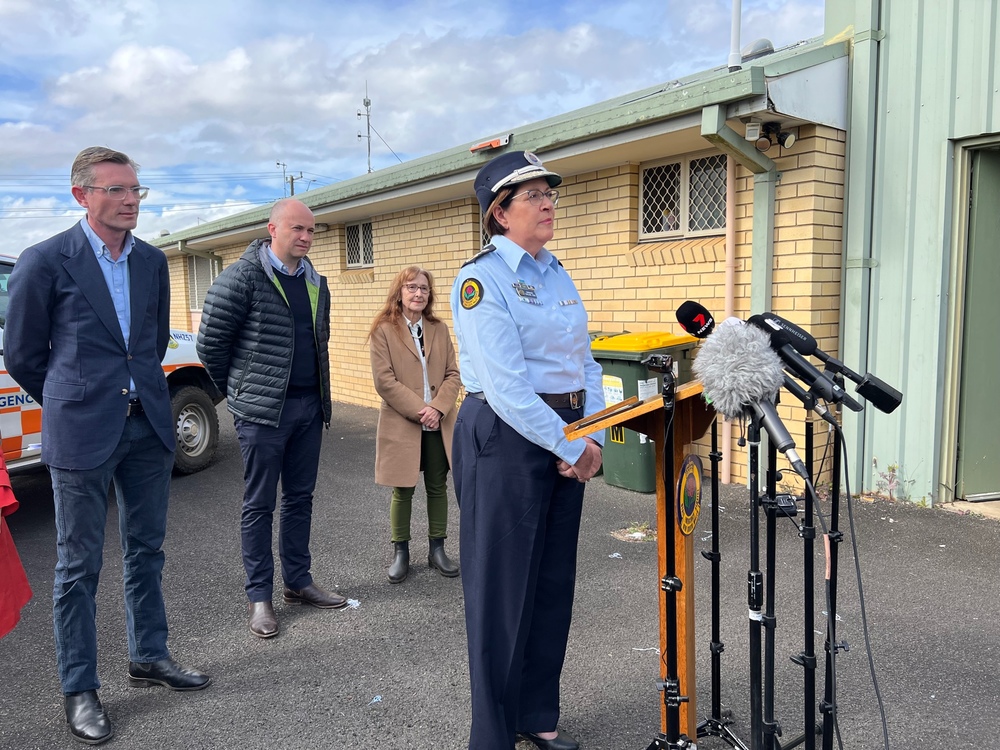New NR's SES Incident Control Building set for Lismore
Simon Mumford
13 June 2022, 4:39 AM
 Premier of NSW Dominic Perrottet at today's funding announcement at the NSW SES Goonellabah headquarters. Photo: Simon Mumford
Premier of NSW Dominic Perrottet at today's funding announcement at the NSW SES Goonellabah headquarters. Photo: Simon MumfordLismore will be the home to a new Northern Rivers SES Incident Control Centre as part of the NSW State Government's record investment of $132.7 million in the NSW State Emergency Services.
While the $132.7 million is going towards infrastructure, resources and staffing across NSW, Lismore will be the hub for the Northern Rivers in a state-of-the-art, purpose-built building constructed out of the flood zone. Member for Lismore Janelle Saffin confirmed that Murwillumbah will be one of the eighteen critical priority Unit facilities that will be updated as part of the funding.
Premier Dominic Perrottet said we can't repeat the mistakes of the past as he reinforced his government's position of supporting Lismore and the Northern Rivers every step of the way into the future, "To make sure that our communities are more resilient when the next natural disaster occurs and that we keep our people safe, have property protected, not just in the short term but well into the future as well."
"That's going to take some long-term thinking and some long-term planning."
SES Commissioner Carlene York didn't confirm how many new staff this would mean for Lismore, however, she did mention there would be approximately 70 additional staff across a range of different areas across the state.

(Commissioner Carlene York with the Premier, Treasurer Matt Kean and Member for Lismore Janelle Saffin)
One of the criticisms to come out of the unprecedented February 28 flood was the training and coordination of the many volunteers both inside and outside the NSW SES.
"It is all about supporting our volunteers, Commissioner York said, "So, there'll be increased staff in relation to training, information and technology, communications and vital positions that we need when we set up these incident command centres so that we have the most appropriately skilled and professional staff available to help those volunteers when they go out."
"It's also important to remember that a lot of the volunteers will come into these centres and work when there is a significant event on, so it's not just about the staff, It's about making sure the premises fit for purpose for our volunteers to work in and a lot of positions that they do for us at a time of need."
This was reinforced by Janelle Saffin when talking about the orange army, "We do need some more volunteers and with better resourcing and better localism at the heart and centre of SES, we will be able to attract more volunteers and that's important, but we also need to attract what we call our spontaneous volunteers, all the locals who went out in tinnies and rescued people during the floods so they will be able to be incorporated better into the rescues that we have and supported."
Commissioner York also addressed communication, an area that was heavily criticised following February 28.
"We anticipate, obviously, that there will be more flooding into the future. This past one in February/March was of record levels. What we really want to do is prepare the communities for when this will happen. We want to make sure we have the right information going out, the right warnings, we have as much time as possible to warn those communities and work with the Bureau of Meteorology in relation to their warnings and forecasts and educate the community on what they can do before the event so that what happened in February/March doesn't happen again and we make sure the community remains as safe as possible."
When the discussion turned to flood mitigation, the Premier said the Flood Inquiry report by Professor Mary O'Kane and Mick Fuller will be with him shortly but this is going to be a long journey as we "build back better in the Northern Rivers".
In the meantime, what about those local people who are in limbo, left with the decision of whether to rebuild to put a roof over their head or wait? What is the Premier's message for those in that position?
"I appreciate their patience. I understand that it's a difficult time but I'd much prefer to have a moment of uncertainty to get a better long-term outcome for them than certainty and a poor outcome."
"That's a challenge and it's difficult, I completely appreciate that. But when something of this devastating nature occurs, we have to think it through properly and make the right public policy decisions. And I actually think the reason bad decisions get made in the past is because there is immense pressure immediately to just get things back to where they were before. Not get things back to a way that improves things well into the future."
"So, to them, I'm sorry and I know that it must be a very difficult time. But I believe that going through the process that we are at the moment will ensure a much better approach into the future."
The $132.7 million Budget boost includes:
- $58.7 million to upgrade 18 critical priority Unit facilities across the State;
- $43 million to split the existing Northern Zone into two new zones, and split the existing Western Zone into two new zones;
- $11.7 million to establish Zone Headquarters in the two new zones with Level 3 Incident Control Centre capabilities;
- $18 million to upgrade existing Zone Headquarters to Level 3 Incident Control Centres; and
- $1.3 million to develop a Facility Strategy and complete further detailed business cases to address the remainder of the recommendations from the 2021 independent review.